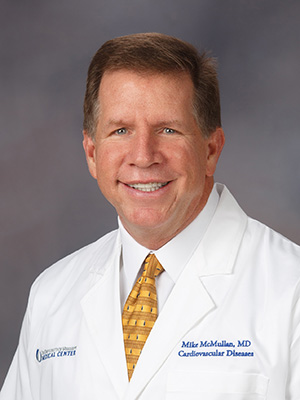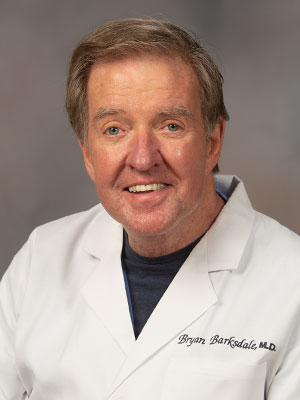Published on Thursday, February 1, 2024
By: Annie Oeth, aoeth@umc.edu
Heart disease may seem to show up unexpectedly, but often there are clues leading the way to a cardiologist’s office.

“Some symptoms may be attention-getting, but some are subtle and may be ignored,” said Dr. Mike McMullan, director of the Division of Cardiology at the University of Mississippi Medical Center. “There are many non-specific symptoms that might signify a heart problem, such as arm and jaw pain, sweating, nausea or swelling.”
Those could be signs of heart disease or a heart attack, or not. Experiencing other, more severe symptoms should prompt a call for help and immediate care, he said.
“The main two symptoms that concern me are, first, new onset symptoms that come with exertion, especially that limit activity and improve with rest, and secondly, fast heart rates that occur for no reason, such as at rest,” McMullan said.
A rapid heart rate, especially when at rest, could be a sign of tachycardia or, less often, a heart attack. The rapid heartbeat of atrial or supraventricular tachycardia keeps the heart’s chambers from filling completely between contractions, which may compromise blood flow to the rest of the body.
Chest pain or tightness or shortness of breath with exertion are among the signs of a potential heart attack as well as the potential for one.
“This is another advantage of regular exercise,” McMullan said. “Besides the benefits from a health standpoint, being active also allows people to notice changes in their activity levels that might signify a problem. New onset exertional chest tightness that limits activity gets my attention.”

Dr. Bryan Barksdale, professor of cardiology, got his warning when he experienced angina, or chest pain, when exercising on a Saturday morning.
“I remember the date – April 18, 2021,” he said. “I had a low risk profile, but I was in enough pain that my wife called for an ambulance to take me to UMMC.”
Barksdale wasn’t having a heart attack, but it was a warning he didn’t ignore. Two days later, he was having a coronary bypass at the Medical Center.
“I’ve had wonderful results,” he said. “The team did a great job, from Dr. Ashok Kumar Coimbatore Jeyakumar and the surgical team to the ICU staff, the floor nurses and the physical therapists.”
Among women, the most common heart attack symptom is chest pain, but they may have other symptoms such as shortness of breath, nausea, vomiting and pain in the jaw, back, shoulder or arm.
These symptoms are also common with atrial fibrillation, or “a fib”, an irregular heartbeat. Having atrial fibrillation makes strokes more likely.
Heart disease is the leading cause of death for people of most racial and ethnic groups in the United States, statistics from the Centers for Disease Control and Prevention show. In the U.S., one person dies from cardiovascular disease every 33 seconds.
“If you’re concerned about whether you may be having a heart attack, call 911,” McMullan said. “That is the fastest way to receive the care that might save your life.”
Barksdale agrees. “If you’re having chest pain, never drive yourself to the hospital.”
To offer more insight into your heart’s health, UMMC is offering healthy heart screenings at the University Physicians Pavilion on the UMMC campus on Tuesday and Friday mornings.
“Our program offers a quick – less than 30 minutes – and comprehensive screening that includes a computed tomography (CT) coronary artery calcium (CAC) scan, lab tests for cholesterol and diabetes, electrocardiogram, and measurement of blood pressure and body mass index,” said Dr. Bradley Deere, assistant professor of cardiology.
The results give an individualized and accurate risk assessment that can be used to help tailor a heart healthy plan, make treatment decisions, and lower the risk of having a heart attack or stroke. The testing is best for those who aren’t sure if they’re experiencing heart-related symptoms.
“Screening can be helpful if you have several risk factors for heart disease but are not sure about starting medical therapy,” Deere said. “It isn’t useful if you already had a heart attack, stroke, or coronary stent or bypass surgery.”
To make an appointment, call 601-815-4321.